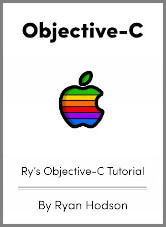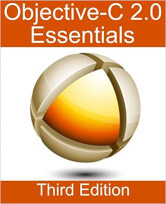Last Updated on April 28, 2023
Objective-C is a general-purpose, dynamic, object-oriented programming language that adds Smalltalk-style messaging to the C programming language. It’s designed to be easy to use and read, while enabling sophisticated object-oriented design.
Objective-C was the main programming language supported by Apple for macOS, iOS, and their respective application programming interfaces (APIs), Cocoa and Cocoa Touch, until the introduction of Swift in 2014.
Apple would prefer Objective-C to be considered dead and buried. But some developers prefer Objective-C to Swift. The TIOBE Index currently ranks Swift in 13th place and Objective-C in 19th place.
Here’s our recommended free books to learn Objective-C.
1. Essential Objective-C by Krzysztof Kowalczyk
 Essential Objective-C is a free book about Objective-C programming language.
Essential Objective-C is a free book about Objective-C programming language.
It’s written to provide clear and concise explanation of topics for programmers both starting to learn the language as well as those diving in more complex topics.
Most examples are linked to online playground that allows you to change the code and re-run it.
The book is licensed under the Creative Commons Attribution-ShareAlike 3.0 license.
2. Conceptive C by Harry McGeough

Conceptive-C is an AI programming language based on Objective-C and C Language. It’s a superset of both languages and is designed to work with Apple Mac OS X and iOS. The implementation is currently under development for GNU GCC.
Conceptive C uses concepts to program natural language and Artificial Intelligence based computer language based on Objective C.
3. Ry’s Objective-C Tutorial by Ryan Hodson

This book serves as both a concise quick-reference and a comprehensive introduction for newcomers to the Objective-C programming language. It walks through each language feature step-by-step, explaining complex programming concepts via hands-on examples.
This tutorial focuses solely on the programming language, rather than on iOS or Mac App development. You won’t walk away with the ability to create your own iPad apps, but you will be incredibly prepared to continue down that path.
4. Objective-C 2.0 Essentials by Neil Smyth

The Objective-C 2.0 Essentials online book contains 34 chapters of detailed information intended to provide everything necessary to gain proficiency as an Objective-C programmer for both Mac OS X and iPhone development.
The objective of this book is to teach the skills necessary to program in Objective-C using a style that is easy to follow, rich in examples and accessible to those who have never used Objective-C before. Topics covered include the fundamentals of Objective-C such as variables, looping and flow control. Also included are details of object oriented programming, working with files and memory and the Objective-C Foundation framework.
Those who have developed using other programming languages such as C, C++, C# or Java will find much about Objective-C that is familiar. That said, there are aspects of the language syntax that are unique to Objective-C. Even experienced programmers should therefore expect to spend some time transitioning to this language before embarking on a major development project.
All books in this series:
| Free Programming Books | |
|---|---|
| Ada | ALGOL-like programming language, extended from Pascal and other languages |
| Agda | Dependently typed functional language based on intuitionistic Type Theory |
| Arduino | Inexpensive, flexible, open source microcontroller platform |
| Assembly | As close to writing machine code without writing in pure hexadecimal |
| Awk | Versatile language designed for pattern scanning and processing language |
| Bash | Shell and command language; popular both as a shell and a scripting language |
| BASIC | Beginner’s All-purpose Symbolic Instruction Code |
| C | General-purpose, procedural, portable, high-level language |
| C++ | General-purpose, portable, free-form, multi-paradigm language |
| C# | Combines the power and flexibility of C++ with the simplicity of Visual Basic |
| Clojure | Dialect of the Lisp programming language |
| ClojureScript | Compiler for Clojure that targets JavaScript |
| COBOL | Common Business-Oriented Language |
| CoffeeScript | Transcompiles into JavaScript inspired by Ruby, Python and Haskell |
| Coq | Dependently typed language similar to Agda, Idris, F* and others |
| Crystal | General-purpose, concurrent, multi-paradigm, object-oriented language |
| CSS | CSS (Cascading Style Sheets) specifies a web page’s appearance |
| D | General-purpose systems programming language with a C-like syntax |
| Dart | Client-optimized language for fast apps on multiple platforms |
| Dylan | Multi-paradigm language supporting functional and object-oriented coding |
| ECMAScript | Best known as the language embedded in web browsers |
| Eiffel | Object-oriented language designed by Bertrand Meyer |
| Elixir | Relatively new functional language running on the Erlang virtual machine |
| Erlang | General-purpose, concurrent, declarative, functional language |
| F# | Uses functional, imperative, and object-oriented programming methods |
| Factor | Dynamic stack-based programming language |
| Forth | Imperative stack-based programming language |
| Fortran | The first high-level language, using the first compiler |
| Go | Compiled, statically typed programming language |
| Groovy | Powerful, optionally typed and dynamic language |
| Haskell | Standardized, general-purpose, polymorphically, statically typed language |
| HTML | HyperText Markup Language |
| Icon | Wide variety of features for processing and presenting symbolic data |
| J | Array programming language based primarily on APL |
| Java | General-purpose, concurrent, class-based, object-oriented, high-level language |
| JavaScript | Interpreted, prototype-based, scripting language |
| Julia | High-level, high-performance language for technical computing |
| Kotlin | More modern version of Java |
| LabVIEW | Designed to enable domain experts to build power systems quickly |
| LaTeX | Professional document preparation system and document markup language |
| Lisp | Unique features - excellent to study programming constructs |
| Logo | Dialect of Lisp that features interactivity, modularity, extensibility |
| Lua | Designed as an embeddable scripting language |
| Markdown | Plain text formatting syntax designed to be easy-to-read and easy-to-write |
| Objective-C | Object-oriented language that adds Smalltalk-style messaging to C |
| OCaml | The main implementation of the Caml language |
| Pascal | Imperative and procedural language designed in the late 1960s |
| Perl | High-level, general-purpose, interpreted, scripting, dynamic language |
| PHP | PHP has been at the helm of the web for many years |
| PostScript | Interpreted, stack-based and Turing complete language |
| Prolog | A general purpose, declarative, logic programming language |
| PureScript | Small strongly, statically typed language compiling to JavaScript |
| Python | General-purpose, structured, powerful language |
| QML | Hierarchical declarative language for user interface layout - JSON-like syntax |
| R | De facto standard among statisticians and data analysts |
| Racket | General-purpose, object-oriented, multi-paradigm, functional language |
| Raku | Member of the Perl family of programming languages |
| Ruby | General purpose, scripting, structured, flexible, fully object-oriented language |
| Rust | Ideal for systems, embedded, and other performance critical code |
| Scala | Modern, object-functional, multi-paradigm, Java-based language |
| Scheme | A general-purpose, functional language descended from Lisp and Algol |
| Scratch | Visual programming language designed for 8-16 year-old children |
| SQL | Access and manipulate data held in a relational database management system |
| Standard ML | General-purpose functional language characterized as "Lisp with types" |
| Swift | Powerful and intuitive general-purpose programming language |
| Tcl | Dynamic language based on concepts of Lisp, C, and Unix shells |
| TeX | Markup and programming language - create professional quality typeset text |
| TypeScript | Strict syntactical superset of JavaScript adding optional static typing |
| Vala | Object-oriented language, syntactically similar to C# |
| VHDL | Hardware description language used in electronic design automation |
| VimL | Powerful scripting language of the Vim editor |
| XML | Rules for defining semantic tags describing structure ad meaning |
